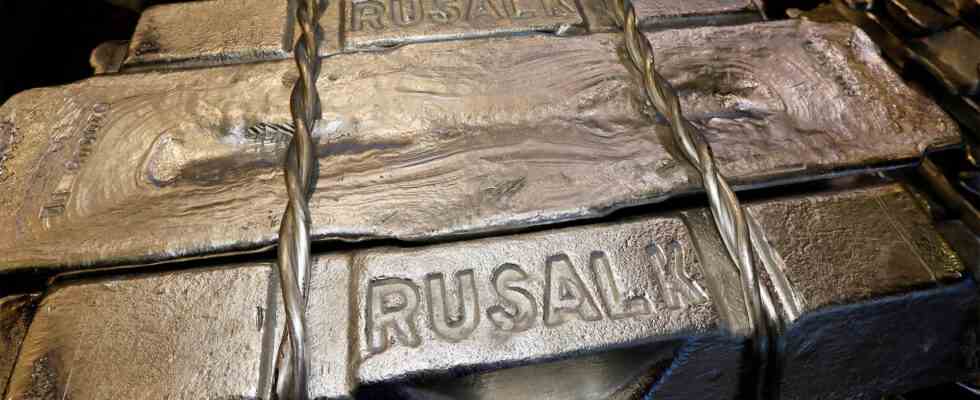Exclusive
Status: 03/31/2022 12:00 p.m
The federal government has contrasts-Information successfully used to get EU not to sanction imports of certain metals from Russia.
According to information from the ARD political magazine contrasts Successfully used in confidential talks with the EU in mid-March to ensure that certain metals supplied by state-controlled Russian companies do not appear on the draft list of new Russia sanctions.
This is reported by several diplomats involved in the matter contrasts. Other EU countries had previously suggested imposing sanctions on nickel, palladium, copper, iron ore, aluminum and titanium. The reason for the German position is apparently to protect German economic interests. On average, a total of around 370 million euros flow from Germany every month for the import of metals to Russia.
“Exceptions to supply the economy and the population”
On request from contrasts The responsible Federal Ministry of Economics explained that a general ban on the import of metallic raw materials had not even been discussed up to now. “The raw materials mentioned in your question (…) are not generally exempt from the new EU sanctions against Russia. Rather, it is an exception (…). These exceptions are aimed at supplying the European economy and population.”
The mechanism by which sanctions are imposed within the EU is strictly confidential. In most cases, the EU Commission clarifies with each member country which sanctions would be unacceptable for that country. Only then will a draft list of sanctions be drawn up, which will be discussed in strict confidence at the level of the EU ambassadors. If an economic sector does not appear on the draft list because a country has signaled its opposition in advance, then this sector is not even put up for discussion. The sanctions are thus the lowest common denominator of the 27 EU countries.
What price is Germany willing to pay?
A senior EU diplomat in Brussels commented on the intervention in favor of its own business interests as follows: “It happens again and again. One country intervenes on behalf of its diamond exchange, another raises concerns about its fashion industry, but Germany has to be asked what price it is willing to pay is to be paid”. The German advance in metals is also explosive because the federal government has repeatedly emphasized that it is prepared to accept the high financial costs of the sanctions.
An immediate ban on imports of the raw materials oil, gas and coal, which account for the lion’s share of Russian export earnings, would have devastating economic effects for Germany. Aircraft manufacturers such as Airbus are currently also dependent on titanium from Russia. With other products, such as palladium, however, this is not so clear. Only around a quarter of the palladium processed in Germany comes from Russia, the metal is needed here primarily for catalytic converters in the automotive industry.
They are produced by medium-sized companies such as Ernst Apparatebau from Hagen. There one sees a possible ban on the import of palladium from Russia, the cost of the metal is only 50 euros. “In the event of sanctions against Russia as far as palladium is concerned, the price can triple. That means that in the end the catalyst will no longer cost 800 euros, but 900 euros,” says Marcel Sprenger contrasts. “We could handle it very, very well. It is possible to bridge all of these problems with supply relationships worldwide,” explains automotive expert Ferdinand Dudenhöffer in an interview contrasts.
Criticism of the German attitude towards sanctions
Clear criticism of Germany’s position on sanctions against Russia comes from Ukrainian President Volodymyr Zelenskyy. “When we asked for preventive sanctions, we turned to you. Sanctions designed in such a way that the aggressor feels that you are a force. And we saw a delay. We felt a resistance. We understood that you are the ‘Economy, economy, economy’ want to continue,” says Zelenskyj in his video-transmitted speech on March 17 before the Bundestag.
According to several diplomats in Brussels, Germany, along with Austria, Hungary and Italy, will become the camp of the “Hesitants”, the procrastinator, when it comes to sanctions. Another camp, the so-called “sanctionistas”which primarily includes Poland, Estonia, Latvia and Lithuania, is pushing for an expansion of sanctions against Russia.
“Yes, there is an economic price and yes, it is high, but the Ukrainian people are not paying in euros or dollars, they are paying with their own blood. I mean, if we issue really tough sanctions, if the Russian military machine and the Russian If the economy collapses faster, then the economically difficult time for us will also be shorter,” argued Edgars Rinkēvičs, Latvia’s Foreign Minister in an interview contrasts. According to Rinkēvičs, a combination of very strict sanctions and large arms deliveries to Ukraine is the best way to end the war quickly.
How effective are the sanctions?
Diplomats from other EU countries also emphasize opposite contrasts, how important further sanctions against Russia are. The Kremlin is constantly trying to circumvent existing sanctions, for example via trade via Belarus, which is being used as a loophole. The initial shock of the sanctions for the Russian economy is slowly wearing off, which is also reflected in the fact that the slide in the ruble has largely stopped a week ago and is being traded again on the Moscow stock exchange, albeit subject to certain conditions. Only in the area of aviation did the EU sanctions have a drastic effect, now it would be a matter of impeding land and sea traffic to Russia. But the key is to become independent of Russian oil, gas and coal imports. Yesterday Poland declared that it would completely stop buying gas and oil from Russia by the end of the year.

